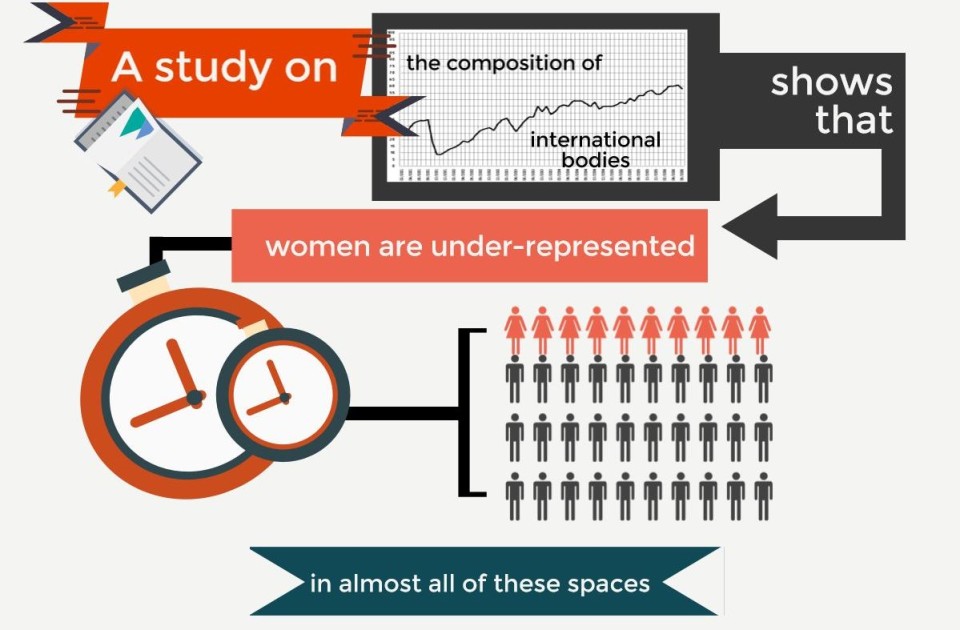
A new campaign, GQUAL, aims to address the gender imbalance on international courts and human rights bodies, where women make up less than 25% of the existing membership. [GQUAL Press Release] The campaign will work to change the nomination and voting practices of States and the relevant institutions, to ensure that gender balance is a real consideration. Through its website, declaration, petition, events, and informational materials, the campaign is striving to raise awareness, engage civil society voices, and increase the transparency of election processes. Additionally, the GQUAL Jobs Board provides information on recent and upcoming elections for nearly all international tribunals and monitoring bodies. On September 17, 2015, the GQUAL (for “gender equal”) campaign formally launched at the United Nations (UN) Headquarters in New York. [GQUAL Press Release]
The campaign is premised on the ideas that international institutions, which have a real impact on people’s lives, should be models for the world to follow and that gender balance will contribute to their legitimacy and informed decision-making. Moreover, the campaign asserts, gender equality is a worthwhile and necessary goal in and of itself. [El Pais] This campaign is spearheaded by the Center for Justice and International Law (CEJIL), with support from other organizations and a group of advisors. See GQUAL, Who We Are.
The video of GQUAL’s campaign launch is available on UN Web TV.
Gender Imbalance on International Bodies
According to a study conducted by GQUAL, the lack of gender parity, specifically the underrepresentation of women, affects almost all international tribunals and monitoring bodies. They report that women hold only 17% of positions on international courts and 25% of positions on regional human rights bodies. [GQUAL Press Release] The GQUAL Declaration notes that States are generally responsible for nominating and electing candidates to these international bodies, but often lack transparent guidelines and procedures for such processes. Additionally, most States do not have mechanisms to correct gender disparities. By not respecting the principle of non-discrimination, States Parties may be in violation of Article 8 of the Convention on the Elimination of All Forms of Discrimination against Women (CEDAW). [CEJIL Press Release]
With respect to international courts, three of the 15 judges on the International Court of Justice (ICJ) are women, one of the 21 members of the International Tribunal for the Law of the Sea (ITLOS) is a woman, and two of the 17 permanent judges on the International Criminal Tribunal for the Former Yugoslavia (ICTY) are women.
Regarding regional human rights tribunals, none of the judges currently on the Inter-American Court of Human Rights (IACtHR) are women, and only 14 of the 45 judges on the European Court of Human Rights (ECtHR) are women.
With respect to regional human rights commissions, three of the seven commissioners on the Inter-American Commission on Human Rights (IACHR) are women, and six of the 11 commissioners on the African Commission on Human and Peoples’ Rights (ACHPR) are women.
This imbalance is also true of UN treaty bodies. For example, just three of the 18 members of the Committee on Economic, Social and Cultural Rights (CESCR) are women, four of the 18 members of the Committee on the Elimination of Racial Discrimination (CERD) are women, and three of the 14 members of the Committee on Migrant Workers (CMW) are women. See GQUAL, GQUAL Jobs Board.
On this same topic, on September 22, 2015, the Global Initiative for Economic, Social and Cultural Rights, the Programme on Women’s Economic, Social and Cultural Rights, and the International Service for Human Rights circulated a letter to all UN Permanent Missions in Geneva and New York highlighting their concern regarding the under-representation of women on the Committee for Economic, Social and Cultural Rights (CESCR) and emphasizing the need for independence in the appointment process. These organizations are also cooperating with their partners to identify qualified female candidates to nominate for the Committee for the nine available seats in the April 2016 election.
The GQUAL Campaign
Prior to the launch, the organizers of GQUAL developed and distributed a declaration regarding the strategies and objectives of the GQUAL campaign, which was signed by more than 700 individuals, including Ana Helena Chacón, the Vice President of Costa Rica; Silvia Fernández de Gurmendi, President of the International Criminal Court (ICC); and Margot Wallström, the Swedish Minister of Foreign Affairs. [CEJIL Press Release] Hundreds of civil society actors, including international jurists, journalists, and scholars gathered to support the launch of the campaign. [CEJIL Press Release]
The goals of the GQUAL campaign include: monitoring elections and the composition of international bodies, supporting the development of transparent mechanisms to promote gender parity, promoting gender equality as a right, getting States to pledge to nominate and vote in a way that promotes gender parity, and building an engaged network. See GQUAL, About GQUAL.
To attain these goals, GQUAL will maintain a Jobs Board that monitors the composition of international bodies, publicizes vacancies, and provides information on the nomination and voting process of each body; create a space to discuss best practices concerning the selection process; and foster a dialogue between States, international tribunals and monitoring bodies, and international organizations in order to develop transparent guidelines and mechanisms to promote participatory nomination and selection processes and gender parity. Additionally, GQUAL will promote the study of the under-representation of women in international bodies from a human rights law perspective and create connections between GQUAL supporters. In order to get 10 to 15 States to make the pledge outlined in the GQUAL Declaration by 2017, GQUAL will meet with States’ representatives to get the executive branch and foreign ministry to make a commitment to nominate candidates and vote in a way that promotes gender parity. See GQUAL, About GQUAL]
Those interested in subscribing to the GQUAL network and receiving alerts can sign up on GQUAL’s website.
Additional Information
To learn more about women’s human rights and human rights courts and monitoring bodies visit IJRC’s Online Resource Hub.
